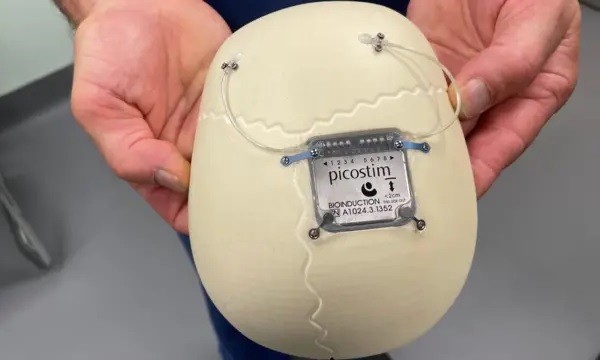24/06/2024
24/06/2024

LONDON, June 24: In a remarkable medical achievement, a young boy diagnosed with severe epilepsy has become the first patient globally to undergo a trial for a revolutionary device implanted in his skull to manage seizures.
Oran Knowlson, now 13 years old, underwent a groundbreaking surgery at Great Ormond Street Hospital in London as part of the CADET project, a collaborative effort involving several prominent medical institutions. Oran, from Somerset, suffers from Lennox-Gastaut syndrome, a rare and treatment-resistant form of epilepsy that he developed at the age of three, causing him to endure multiple seizures daily.
The innovative neurostimulator device, known as the Picostim neurotransmitter and developed by UK-based company Amber Therapeutics, emits electrical signals deep into Oran's brain, aiming to disrupt abnormal bursts of activity that trigger seizures. The surgery, conducted in October 2023, involved the precise placement of two electrodes into Oran’s brain, targeting the thalamus, a crucial relay station for neuronal information.
Consultant paediatric neurosurgeon Martin Tisdall led the surgical team, ensuring meticulous placement of the electrodes with a margin of error less than a millimetre. Unlike previous methods where neurostimulators were placed in the chest, the Picostim device is implanted directly into the skull, minimizing potential complications and maximizing effectiveness, particularly in children.
Oran's mother, Justine, shared her hopes for the surgery to provide relief from the debilitating effects of epilepsy, stating, "I want him to find some of himself again through the haze of seizures. I’d like to get my boy back." Remarkably, post-surgery, Oran has experienced an 80% reduction in daytime seizures, significantly improving his quality of life.
Justine expressed her gratitude towards the medical team at Great Ormond Street Hospital, remarking on the tremendous improvement in Oran's condition. Despite knowing that the treatment is not a cure, the family remains hopeful for Oran's continued progress and eagerly anticipates advancements in epilepsy management.
As part of ongoing research, Oran's treatment will serve as a blueprint for three additional children with Lennox-Gastaut syndrome to receive the neurostimulator. Future plans involve the device responding in real-time to changes in brain activity, potentially preempting seizures before they occur.
Oran's story marks a significant milestone in epilepsy treatment, offering hope to patients worldwide grappling with the challenges of managing severe forms of the condition. With continued advancements in medical technology, the future holds promise for improved outcomes and enhanced quality of life for individuals like Oran.


